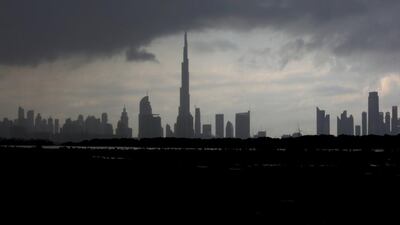The IMF has called for the government to take stronger measures to help ease speculation in Dubai’s property market.
It would like to see higher fees on flipping, the name given to the quick turnaround in property sales, said officials with the fund.
“It’s time to consider stronger measures, particularly in terms of ways to discourage quick turnarounds – what people refer to as flipping - of real estate in Dubai,” said Masood Ahmed, director of the Middle East and Central Asia department at the IMF, speaking in Dubai on Tuesday.
A run up in property prices in the past year has heightened jitters about the risk of a repeat of the speculative asset bubble, which burst in 2009 in the wake of the global financial crisis. Prices last year increased by an average of 45 per cent in key Dubai neighbourhoods, according to the website propertyfinder.ae.
Mohamed Lahouel, chief economist of the Dubai Department of Economic Development, said “human greed” was to blame for the escalation in prices to date.
“Although it is very difficult to separate between speculation and real demand, there is certainly speculation that is going on in the real estate market today,” he said. “What worries me is that human greed is driving it.”
The IMF's Mr Ahmed praised the action of authorities so far in controlling the market. The Central Bank last year issued mortgage caps for nationals and expatriates, as well as guidelines limiting the amount banks lend to government-linked companies to no more than 25 per cent of their equity, or more than 100 per cent of their capital. Many government-linked companies are big investors in the property market. In addition, the Dubai Land Department in October doubled property registration fees to 4 per cent from 2 per cent.
But such measures have been aimed more at safeguarding against a feverish build up of lending linked to the property market than taming activity among cash buyers, who account for a large chunk of property deals. The UAE has become a hotspot for property investment from wealthy foreign buyers, partly as a result of regional instability elsewhere during the past three years.
"What we've been discussing from the experience of other countries is why not consider a differentiated system of fees where transactions that look more like speculative transactions once they get turned over in a very short period by non-residents or even foreigners see a higher fee than is currently planned, while other transactions, say by residents here who are wanting to buy their first house with a mortgage, could have a much lower fee," said Harald Finger, deputy division chief of the regional studies division at the IMF's Middle East and Central Asia department and who is completing the fund's annual mission to the UAE.
He said the IMF had made a recommendation to the Dubai Land Department to consider variable transaction fees.
It has suggested the UAE could follow the example of Hong Kong and Singapore, which have both taken action to dampen property speculation. In October 2012, Hong Kong enacted a 15 per cent buyer’s stamp duty against home purchases by foreigners, while Singapore raised fees to a similar level last year.
Speaking at the same event as the IMF officials, Ashok Aram, chief executive of Deutsche Bank in the Middle East and North Africa, voiced concerns about the dent Dubai’s competitiveness would receive if prices continue surging.
“Dubai’s relevance is of being positive in a region with some growth and some risks,” he said. “If costs move ahead too fast that won’t be good for Dubai.”
The Institute of International Finance on Monday released a report examining the sustainability of the recent run in property prices. It said the probability of a large correction in the market was “fairly low” but risks could escalate if prices continue rising rapidly this year.
tarnold@thenational.ae
Follow us on Twitter @Ind_Insights

